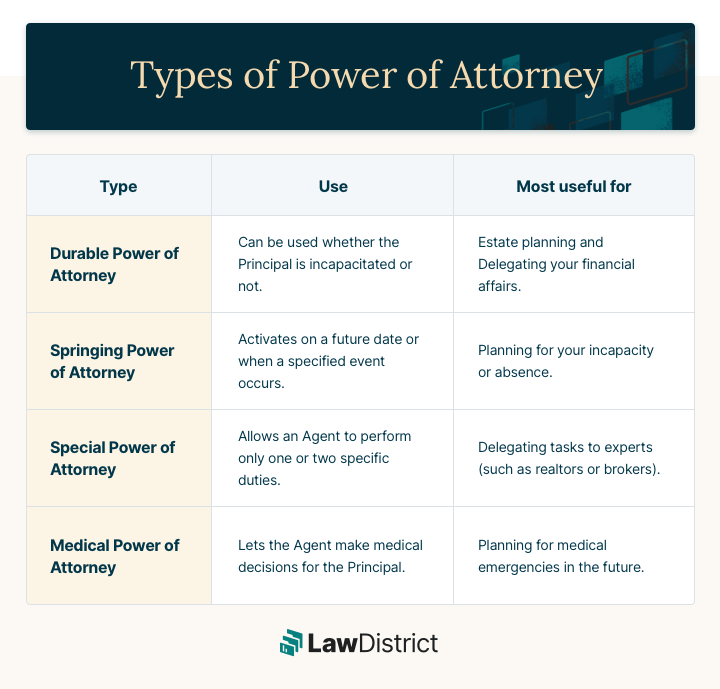Choosing the right type of Power of Attorney (POA) legal form can be a big decision. There are many different options available to an individual (known legally as the principal) seeking to transfer their authority to an agent (sometimes known as the Attorney-in-Fact) for decision-making purposes.
Whilst the person you grant Power of Attorney to doesn’t need to be a lawyer they should be someone you trust to make the necessary choices for you effectively. You should also grant them the correct authority depending on the functions you want them to perform.
To help you get this decision right, we’ve explained the different types of power of attorney people can opt for and how they apply to various situations and arrangements.

General Power of Attorney
- Who needs it: Anyone looking to nominate an agent for a temporary period of time
- What are the powers: Depending on the agreement, this grants the agent broad-reaching financial and legal powers
- When do the powers end: When the POA is revoked, a new agent is appointed, the principal dies or becomes incapacitated
A General Power of Attorney is one of the simplest forms of this legal instrument you can obtain. The document grants wide-ranging powers to an appointed agent allowing them to manage all the financial and legal affairs of the principal (unless otherwise specified). This is normally only for a limited time however, as it expires if the principal dies or is medically incapacitated for any reason.
Special Power of Attorney
- Who needs it: Someone granting powers to an agent for a singular purpose
- What are the powers: The powers are individually specified by the principal
- When do the powers end: When it is revoked, the service has been completed or the principal dies
A Special Power of Attorney is a much more specialized form of POA. This usually gives the Agent very specific and limited powers and does not cover all their financial activities like other documents.
Normally, Special POA is used by the principal to give the Attorney-in-Fact the capacity to carry out a one-time transaction or to sell real estate on their behalf. Once these stipulated actions have been carried out the POA usually lapses or ends on a pre-defined date.
Durable Power of Attorney
- Who needs it: Anyone seeking help managing their affairs either before or after becoming incapacitated
- What are the powers: Depending on the agreement this can be some of all of your financial activities
- When do the powers end: When the principal dies, another agent is appointed or the instrument is revoked
A Durable Power of Attorney is a much more robust form of legal instrument. Unless specified otherwise, or revoked, it can apply for the rest of the principal’s life. This functions in a similar way to a General POA, however, it also allows the agent to manage your financial and personal affairs even if you are medically or mentally incapacitated.
Read more: Durable vs General Power of Attorney: Which is Best for You?
Medical Power of Attorney
- Who needs it: Individuals with healthcare concerns or complications
- What are the powers: The agent may make decisions based on your medical well-being or treatment needs
- When do the powers end: When the principal dies, it is revoked or you appoint a new agent
A Medical Power of Attorney functions in a similar way to a Durable POA in that it functions even if you are incapacitated. However, unlike other forms of this legal instrument, it allows an agent to make far-reaching healthcare decisions on your behalf. The document sets out what your medical wishes are in certain circumstances and empowers the agent to ensure that they are followed.
Springing Power of Attorney
- Who needs it: Individuals needing a flexible and safe contingency for their business or financial activities
- What are the powers: Specified and defined by the principal
- When do the powers end: When the principal dies, the POA is revoked or expires, or you appoint a new agent
A Springing Power of Attorney is a much more flexible version of a durable POA. However, Springing POAs differ from their durable cousins as they are intended for more flexible, temporary circumstances rather than for a long term period.
It normally comes into effect when you are incapacitated for any reason medically or if a triggering event occurs and you cannot respond to it personally (for example if you are out of the country). The situations that allow this kind of POA to be used by the agent must be clearly defined when creating your document.
Before you start preparing a Power of Attorney, remember some of these particular responsibilities may need to be notarized depending on your state. Also, consider carefully what powers you will need to grant and also what might need to be done if you need to revoke or override your POA.
Nevertheless, creating a Power of Attorney to suit your specific needs doesn’t have to be a complicated process. LawDistrict’s flexible tools and easy-to-use form creation guidelines can help you create the ideal legal instrument for your requirements completely from scratch.
Create an Official POA Now
Read more:
Power of Attorney Rights and Limitations
How to Give Someone Power of Attorney
Medical VS Financial POA



